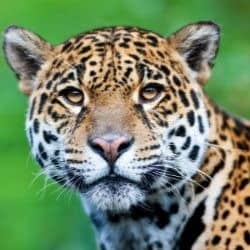Increase in Illegal Jaguar Trade

Jaguars in the wild are classified as near threatened. There are estimated to be 173,000 left in Central and South America, and that number is falling. Their decline is largely due to three reasons. In part it is due to ranchers shooting them for attacking their cattle. A greater threat is deforestation, with about 50% of their historical natural habitat having been destroyed. The third reason is the illegal trade in jaguar body parts for eventual use in products.
Increase in illegal trade
A recent report published in the Conservation Biology Journal notes that there has been an increase in the illegal trade of jaguar parts over the past decade. It examines a possible link between the increase and an upturn in investment from China in Central and South America. Between 2012 and 2018, over 800 jaguars were killed for their teeth, skins and skulls to be smuggled to China.
Alternative to Tiger Products
There is a theory that the increase may be down to jaguars being sought out as an alternative in China to rare wild tigers. Tiger body parts are well documented to be highly prized for use within Chinese medicine, and their skins used for furniture, clothing and accessories, and teeth for jewellery.
According to the report, there were 2000 illegally smuggled jaguar teeth intercepted between 2012 and 2018. If jaguars were being targeted as an alternative to tigers, the experts would expect the volume to be greater. However, those numbers are only those that were found, those that were successfully smuggled could be much higher. Law enforcement in Central and South America traditionally look out for drugs and firearms, so illegal animal smuggling could be far greater than known.
Further research and investigation required
Both the Chinese and Latin American governments are actively cooperating in stopping the illegal trade. The report points out that only a small minority of people within China are involved in this illegal activity. The underground nature of the trade makes it hard to assess the reasons behind it. So, although the trade of jaguar parts is on the rise, it is unsure exactly what the end use of the parts are once in China therefore further research and investigation is required before any conclusions can be drawn.
Irrespective of the end use, the need to remove the demand for buying jaguar products within China is critical. Similarly, local communities within Central and South America need to be supported to stand up against the illegal trade rather than being enticed by the corrupt trade networks.
If you would like to support threatened jaguars please visit our Jaguar Adoption page.



